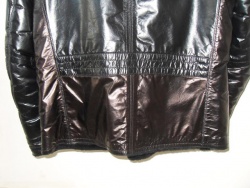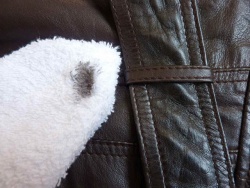Difference between revisions of "Leather defects"
From www.leather-dictionary.com - The Leather Dictionary
| Line 4: | Line 4: | ||
| − | + | Defects that appear in the finished [[leather]] are the result of damage to the [[Natural markings on leather|raw skin]], poor [[Storage of leather|storage]] or improper processing during [[Leather production|manufacturing]]. | |
| − | * '''[[Dye transfer from leather]]''' is | + | * '''[[Dye transfer from leather]]''' is the result of insufficient colour fixation. For example, it can be caused by excessively concentrated dyes or insufficient washing after the dyeing stage. If the colour concentration is too high, '''[[Bronzing leather|bronzing]]''' can also occur. |
* In the [[Liming - Leather Tanning|liming process]], excessive contact with fresh air can cause '''liming stains''' on the [[Leather grain - Grain side|grain side]] of the leather. | * In the [[Liming - Leather Tanning|liming process]], excessive contact with fresh air can cause '''liming stains''' on the [[Leather grain - Grain side|grain side]] of the leather. | ||
| Line 14: | Line 14: | ||
* '''Colour defects''' can occur if the applied [[leather colour|colouration]] does not cover uniformly, especially on already damaged areas. | * '''Colour defects''' can occur if the applied [[leather colour|colouration]] does not cover uniformly, especially on already damaged areas. | ||
| − | * '''[[Fatty spue - Fat marks on leather]]''' occurs | + | * '''[[Fatty spue - Fat marks on leather]]''' occurs where leathers have a high fat content, such as [[sheep leather]]. |
| − | * '''Tannin stains''' | + | * '''Tannin stains''' are caused by uneven concentration of the [[Tannins|tanning agent]] in the [[leather production]]. |
* [[Looseness]] is caused by missing leather fibre substance under the grain surface. The surface then tends to form small wrinkles. This is a skin defect of the living animal. Such skins should not even find their way into the [[leather production]]. | * [[Looseness]] is caused by missing leather fibre substance under the grain surface. The surface then tends to form small wrinkles. This is a skin defect of the living animal. Such skins should not even find their way into the [[leather production]]. | ||
Revision as of 13:38, 3 April 2017
Defects that appear in the finished leather are the result of damage to the raw skin, poor storage or improper processing during manufacturing.
- Dye transfer from leather is the result of insufficient colour fixation. For example, it can be caused by excessively concentrated dyes or insufficient washing after the dyeing stage. If the colour concentration is too high, bronzing can also occur.
- In the liming process, excessive contact with fresh air can cause liming stains on the grain side of the leather.
- Irregular blood stains are caused by lack of drainage of the salt liquor after the preservation of the hides by salting.
- Colour defects can occur if the applied colouration does not cover uniformly, especially on already damaged areas.
- Fatty spue - Fat marks on leather occurs where leathers have a high fat content, such as sheep leather.
- Tannin stains are caused by uneven concentration of the tanning agent in the leather production.
- Looseness is caused by missing leather fibre substance under the grain surface. The surface then tends to form small wrinkles. This is a skin defect of the living animal. Such skins should not even find their way into the leather production.
Bronzing leather and dye transfer from leather.
Additional information










 a kotori web solution
a kotori web solution